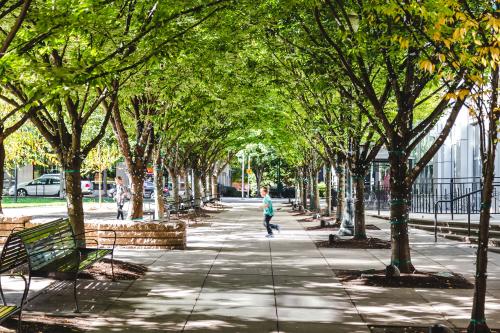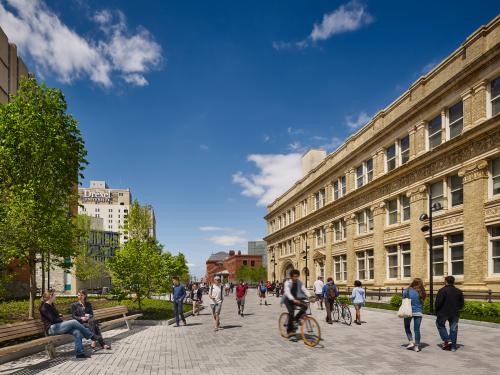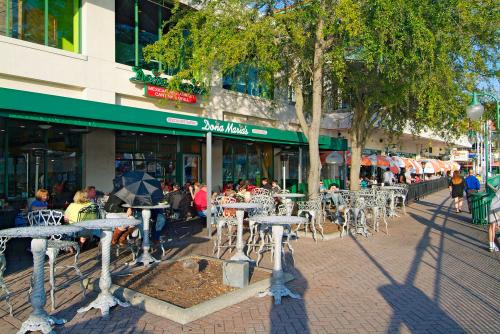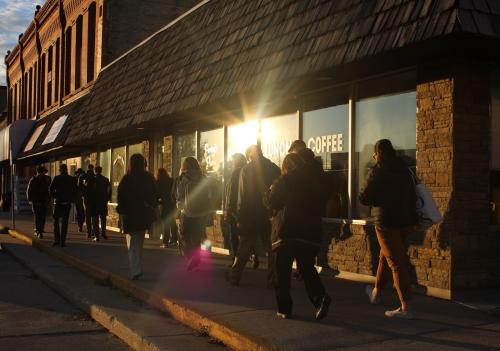Click here to read the other Opportunities for Transformative Placemaking case studies.
Small towns across the country can be as diverse and varied as their urban counterparts. Today’s rural America is a complex tapestry of communities reliant upon different segments of the economy, with different demographic and socio-economic profiles, and facing different place-based issues. Recognizing these variables, many rural communities see common challenges in growing their local economies, maintaining an educated and healthy labor force, and improving their connectivity with the surrounding region.
This profile looks at one rural community, Newcastle, Wy., a town with roots in the oil and coal industries looking to diversify its economy through tourism, locally grown entrepreneurship, and the appeal of small-town living.
History and context
The town of Newcastle is a small main street community in the northeastern corner of Wyoming near the Black Hills. It traces its roots to the westward expansion of the railroad in the late-19th century as company officials were seeking to establish coal-rich rail routes. When coal was discovered in the region in the 1880s, Newcastle and several other towns sprang up and grew rapidly alongside the new coal mines and railroad lines. Officially incorporated in 1889, many of Newcastle’s original buildings still stand, helping to give downtown a distinctive historic character.1
Over the course of the late-19th and 20th centuries, Newcastle grew from a small settlement with a Wild West reputation (early newspaper articles recount instances of miners “shooting up the town”) to a regional employment hub within Weston County. Newcastle’s original industry, coal, along with the addition of a major oil refinery and improving infrastructure supported steady population growth: the town grew from fewer than 800 residents in 1900 to 3,395 in 1950.2
Today’s economy is a mix of legacy extraction industries and new service-based industries. The Wyoming Refining Company, established in 1927, remains one of the major employers and is central to the town’s industrial identity and community image. While the WRC is a driver of the local economy, it also poses challenges to the area’s quality of life. In recent years, the refinery has experienced spills, leaks, and other environmental issues.3
Other local legacy industries also continue to have a presence in the community. The former Burlington Railroad, now BNSF, maintains a regional office downtown, and there are two nearby coal mines that employ local workers and draw commuting workers from elsewhere in Weston County and neighboring Campbell and Natrona Counties.4
While these legacy industries are central to the town’s self-image and economic base, they are no longer the town’s only dominant employers. As Newcastle’s population has declined since its peak in the 1960s (from 4,345 in 1960 to 3,535 today) the share of jobs by sector has changed.5 For example, in 1970, the mining industry employed over 1,200 people in Weston County, compared to just 411 in 2016.6Lower-paying sectors like educational services, health care and social assistance, and public administration now employ more residents (nearly 41 percent) than mining, oil, and gas extraction (20 percent).7 Some of this change is the result of the volatile nature of employment in these industries; as regulations increase, employment contracts. Additionally, over the years many residents employed in the oil and gas industry and their families have relocated to larger towns nearby like Douglas and Gillette, which offer more amenities and easier access to the interstate. This shift has impacted the quality of life in Newcastle, as well as the way local residents perceive their community. Downtown vacancies have increased, business diversity has decreased—most downtown businesses are now service related operations like financial services, insurance, and real estate—and many residents have a fairly negative perception of conditions in their community.8
Challenges and opportunities
As national regulations on extractive industries change and consumer preferences shift, so too do the economic fortunes of towns like Newcastle. While the town is faced with a series of economic challenges, a number of place-led opportunities and investments could provide new paths for growth and help to improve quality of life for residents.
The presence of the oil refinery close to the historic downtown looms large in Newcastle. While local leaders and residents value its presence as an economic driver and employer, many perceive its location as a hindrance to downtown vitality. In the past decade, the refinery has made efforts to improve its relationship with the community, investing in downtown beautification and supporting community events. The city of Newcastle and the local chamber of commerce are seeking to build on these community-outreach efforts to help improve local perception of the refinery, shifting it from an eyesore to an asset.
Meanwhile, other parts of downtown district have seen some reinvestment in the historic building stock, but numerous vacancies and a lack of dining and retail options still pose a challenge to vitality. Residents also report poor infrastructure and cleanliness issues as deterrents to spending more time downtown. Citing limited options and inconsistent store hours, residents frequently make the hour-and-a-half drive to Rapid City to do their shopping and dining.9
While rebuilding business density and diversity downtown will take time, there is opportunity to work with existing local businesses to build their capacity, so they are better positioned to meet the needs of local shoppers, including fairly simple fixes like maintaining consistent business hours. One local retailer, the Skull Creek Boutique, offers an encouraging example. In addition to selling their own wares, the owners rent out space to other local entrepreneurs and home-based craftsmen and women selling handmade quilts, jewelry, homemade jams and jellies, and custom metalwork. This allows the vendors to stagger their hours, save costs on retail space, and maximize exposure to potential shoppers. Skull Creek Boutique is currently preparing to move into a larger downtown storefront to accommodate growing demand for vendor space.10
Scaling efforts like these could offer Newcastle an opportunity to carve out a distinctive place in the experiential retail economy. While this is still a small segment of the local economy, other rural communities around the country, like Sandpoint, Idaho (home to an enterprising company specializing in search and rescue equipment for the U.S. ski industry) and Berea, Ky. (an arts and crafts hub in Appalachia), are leveraging small-scale manufacturing and the “maker” economy as a way of growing local entrepreneurship and developing or enhancing existing economic sectors.11
Proximity to the Black Hills is perhaps the most significant of Newcastle’s place-based assets. The Black Hills are a major regional tourist draw, but one that Newcastle has only begun to leverage. While at somewhat of a geographic disadvantage due to its distance from Interstate 90—the major highway bordering the Black Hills in South Dakota and eastern Wyoming—the local chamber of commerce and city of Newcastle see an opportunity to tap into the growing tourist and outdoor recreation market in the region. While the town lacks the kinds of major attractions—like caves, water parks, and significant historic sites—that other towns in the region use to draw in tourists, the chamber is working on enhancing its marketing efforts toward millennials who seek more experience-based destinations and rugged off-the-beaten track activities. Along these lines, they currently advertise numerous hiking, fishing, snowmobiling, and hunting activities on their website and the town maintains a Facebook page for outdoor enthusiasts.
Newcastle’s natural scenic beauty, coupled with its slower pace of life and family-friendly reputation, also make it an attractive place for people seeking a quiet place to raise a family, settle down, or retire. There is opportunity to build on these attributes to position Newcastle as destination for young families or retirees by recruiting businesses, enhancing public spaces, and building on programming and promotions that cater to these audiences. Efforts already underway include a weekly farmer’s market and seasonal festivals that attract residents and visitors downtown.
However, these efforts will be put to the test in the coming years by new plans for a oil pipeline in the region which could potentially bring an influx of up to 500 new employees and their families to town.12 The challenge for Newcastle will be to build up the kind of amenities and activities that will attract these families to the community, while also continuing to diversify the local economic base so that Newcastle can ride out the boom and bust nature of the oil industry.
Rural communities like Newcastle and so many others like it across the country are often thought to be at a competitive disadvantage relative to urban areas due to their small size. Though small towns face distinct challenges, incremental changes can lead to significant long-term impact. By leveraging local assets, targeting emerging customer segments, and investing in infrastructure to support new business activity, Newcastle has the opportunity to position itself to be competitive in the modern economy while remaining true to its roots.
-
Footnotes
- “Newcastle, Wyoming,” available at https://www.wyohistory.org/encyclopedia/newcastle-wyoming (September 2018).
- Ibid.
- Dustin Bleizeffer, “A community’s core. It’s a major player, but Newcastle folks say refinery doesn’t define town,” Casper Star Tribune, available at https://trib.com/news/state-and-regional/a-community-s-core/article_5957d6f9-934f-50c3-a80b-18224dd55358.html. April 20, 2008.
- “Newcastle, Wyoming,” available at https://www.wyohistory.org/encyclopedia/newcastle-wyoming (September 2018).
- Historical Decennial Census Population for Wyoming Counties, Cities, and Towns, U.S. Bureau of the Census available at http://eadiv.state.wy.us/demog_data/cntycity_hist.htm.
- “A Profile of Socioeconomic Measures, County Region, Weston County, WY,” available at https://headwaterseconomics.org/tools/economic-profile-system/ (September 2018).
- “Newcastle, Wyoming,” available at https://datausa.io/profile/geo/newcastle-wy/ (September 2018).
- Survey conducted by National Main Street Center, April 20, 2018.
- Ibid.
- Personal communication with Holly Russell, executive director of the Newcastle Chamber of Commerce, September 20, 2018.
- “Rural-Grown, Local-Owned Manufacturing,” available at https://www.aspeninstitute.org/events/rural-manufacturing/ and “The Appalachian City That Raised Its Taxes and Grew,” available at https://nextcity.org/features/view/the-appalachian-city-that-raised-its-taxes-and-grew.
- Personal communication with Holly Russell, executive director of the Newcastle Chamber of Commerce, October 16, 2018.
The Brookings Institution is committed to quality, independence, and impact.
We are supported by a diverse array of funders. In line with our values and policies, each Brookings publication represents the sole views of its author(s).







